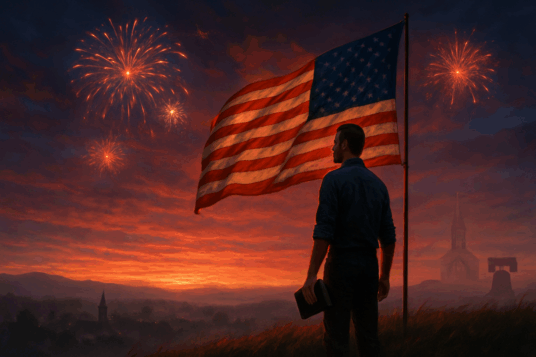As fireworks illuminate the sky this Fourth of July, we do more than mark the passage of another year since 1776. We remember a birth—of a nation rooted not in rebellion, but in principle. It is this radical idea that gave birth to this nation: liberty.
Liberty is the heartbeat of the American story. It’s the God-ordained freedom to live right, protected by a restrained government and sustained by a virtuous people resisting tyranny. The Declaration of Independence, penned nearly 250 years ago, grounded this vision in the eternal, stating that all men are “endowed by their Creator with certain unalienable Rights, that among these are Life, Liberty, and the pursuit of Happiness.”
A Heritage Guided by Providence
This wasn’t a secular theory of rights. It was a declaration before God. The signers of that document pledged their “Lives, Fortunes, and sacred Honor” in “firm reliance on the protection of Divine Providence.”
The Founding Fathers, even those of unorthodox faith, were not secular men. They believed this country rose not by chance or by ingenuity, but by the steady hand of Providence.
“I have lived, Sir, a long time,” Benjamin Franklin remarked during the Constitutional Convention, “and the longer I live, the more convincing proofs I see of this truth—that God governs in the affairs of men.”
Washington echoed the same conviction: “No people can be bound to acknowledge and adore the Invisible Hand which conducts the affairs of men more than those of the United States.”
And that, “every step” of our national rise was marked by “some token of providential agency.”
In fact, from John Adams to Abraham Lincoln, from Theodore Roosevelt to Ronald Reagan, the belief that the hand of God guides the affairs of this nation has been a constant refrain in American leadership. Even the seal proposed by Franklin and Jefferson included Moses parting the Red Sea, standing under the glory of the pillar of cloud, while Pharaoh’s army was swallowed in judgment. Their motto? “Rebellion to tyrants is obedience to God.”
America’s Christian Foundation
The American project was never meant to be divorced from God. “In God We Trust” was not political branding—it was national self-awareness. Our laws, our culture, our concept of human dignity, even our view of government, grew out of the soil of Christian belief. This nation’s strength has always depended on two things: restrained government and restrained men. The former only works if the latter exists. That, in turn, demands moral formation—something government can’t supply and only the church can preserve.
The confidence that God has blessed this nation doesn’t mean America is flawless. It never has been. But it does mean that we are specially called—uniquely accountable—to correct our errors and live more consciously toward truth, justice, and moral order. As George Washington warned, “reason and experience both forbid us to expect that national morality can prevail in exclusion of religious principle.”
The Return of a Forgotten Conviction
In recent decades, America drifted far from its foundation. Progressivism replaced principle. Rights became entitlements. Government swelled while virtue shrank. Christian morality was mocked, and patriotism was painted as nationalistic extremism. But history has a way of sobering a people who forget God.
And now, a change is stirring.
Across the nation, there’s a comeback to our original principles that is taking shape—not merely political, but spiritual. It’s not driven by party platforms but by parents, pastors, and principled citizens rising up again. It’s seen in school board elections, in pulpits that dare to speak truth, in families that reclaim their role, and in courts that return to constitutional limits.
In recent years, our nation has been undergoing what many are recognizing as a moral and cultural reckoning. Across the political spectrum, people are beginning to push back against ideologies and policies that seem to erode truth, distort identity, weaken the rule of law, and entangle us in questionable global alliances. There’s a growing concern over the integrity of our institutions, the shaping of our children’s values in schools, and the unchecked expansion of government authority. In response, we’re seeing renewed efforts to protect parental rights, preserve religious freedom in the public square, and restore justice and accountability in both domestic and foreign affairs.
This comeback is not nostalgia. It’s not about going backward. It’s about returning to first things—the truths that built this country and the God who holds it together.
That reflects a yearning to return to the truths that made America worth celebrating. It reminds us that the American miracle was never meant to be secular, progressive, or globalist. It was built on God-given rights, natural law, local governance, and moral responsibility.
What Liberty Requires
If liberty is to survive, it cannot be the freedom to do what we want. It must be the freedom to do what is right. John Adams warned that “our Constitution was made only for a moral and religious people. It is wholly inadequate to the government of any other.” Without character, freedom decays into license. Without truth, even free men become slaves—slaves to appetites, ideologies, or tyrants.
That’s why Christian voices must not go silent. It’s not enough to vote right or grumble about Washington. We must raise up righteous sons and daughters, build strong churches, shape public conscience, and defend the idea that liberty only lives when holy virtue lives first.
A Living Legacy Worth Fighting For
This Independence Day, let’s celebrate more than a date on the calendar. Let’s remember the legacy we’ve inherited—and the one we’re leaving behind. Liberty, America’s Christian heritage, and the rising tide of original principles are not random. They are the evidence that, even still, “He who made the world still governs it.”
